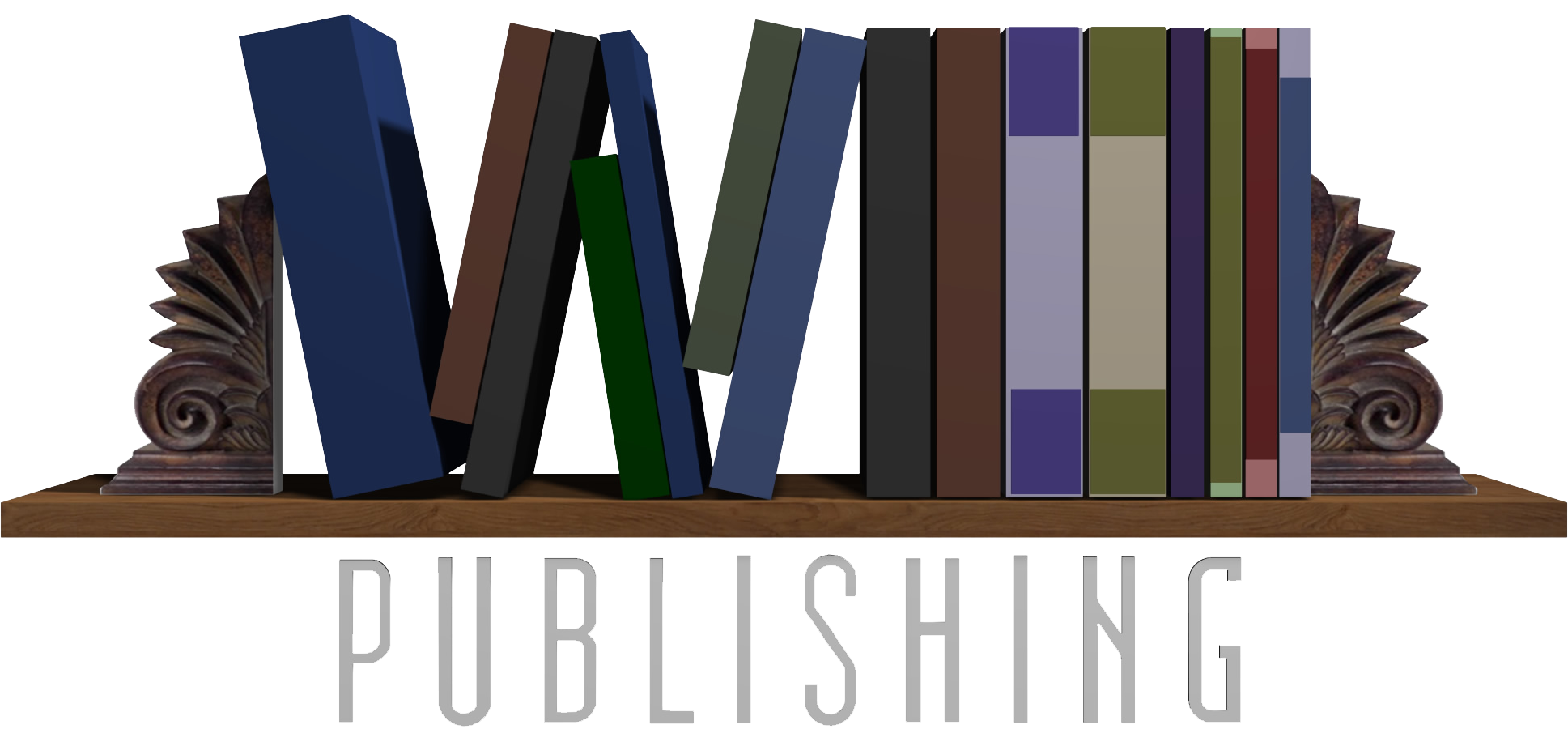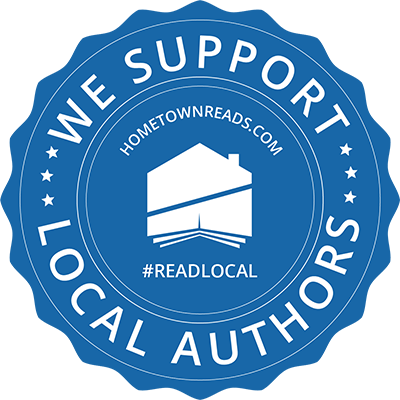- Make a list of all the writing tasks you’d like to accomplish this summer starting with today and ending with August 30th (or whatever 3 month period works for you). What are all the things you’d like to accomplish during that three month period.
- Keep your goals posted somewhere you can see them to keep you on task. Don’t ignore them.
- Are you planning to go to any conferences or retreats?
- Make a sign for the door of the room that you write in the most to help family understand you’re working seriously on your writing during that time. It can be as simple as saying: Do not disturb. Working. Make it clear to your family that at certain times of the day you will be coming out to eat meals with them and catch up on the things that need your attention, but for the most part, you will be focused on your writing.
- Use the buddy system: find a writer friend that has similar goals who you can check in once in a while with on your own progress. Talking will help keep you both motivated.
- Stay positive. Don’t let things distract you from your goals. Believe in yourself. We believe in you! You should, too!
Category: General
E. Tip of the Week: Writing Challenge
I’m teaching a session of writing classes to a group of local writers. Some of the participants have been writing for years, and others are just beginning to take the craft seriously. My challenge to them last week was to double their word count from what they wrote two weeks ago.
Some writers wrote less than 1000 words two weeks ago, some wrote more. One woman wrote 4000 words in less than two weeks, so her challenge is to double it and write more than 8000 words by next Thursday.
Writing challenges can be a great way to get out the excess words that are built inside of us just waiting to come out. Usually not all the words will be used in a final product, but the adrenalin rush from writing so many words in such a short time span can be exhilarating!
My own personal challenge is to write 1000 words a week, or 1000 words on Sunday, my day off from editing. Some days I can write the 1000 words in 30 minutes or so, other days I have to really work at it. But whatever the challenge is, it’s a great feeling to reach my desired goal.
What are some of your own personal writing goals? Are you making them? Is it time to double up your word count and challenge yourself?
Writer’s Wednesday: An Interview with the Edgar and Stoker Nominated Author, Billie Sue Mosiman
I first discovered Billie Sue and her writing in the mid 90s about a year before she edited the anthology, Never Shake a Family Tree. It is with great pleasure to have her as our guest today. Please help me welcome her to The Editing Essentials!
Billie Sue Mosiman is an Edgar and Stoker Nominated author of more than 50 e-books. She published 13 novels with New York major publishers and recently published BANISHED, her latest novel. She’s the author of at least 150 published short stories that were in various magazines and anthologies. Her latest stories will be in BETTER WEIRD edited by Paul F. Olson from Cemetery Dance, a tribute anthology to David Silva, a story in the anthology ALLEGORIES OF THE TAROT edited by Annetta Ribken, and another story in William Cook’s FRESH FEAR. She’s an active member of HWA and International Thriller Writers. She’s working on a new novel of suspense titled THE GREY MATTER. You can visit her at: The Peculiar Life of a Writer http://www.peculiarwriter.blogspot.com, or at Facebook: http://www.facebook.com/billie.s.mosiman or on Twitter: @billiemosiman or at Billie Sue’s Amazon Page.
WD: Does your family support your writing career, and if so, have they always?
BM: Yes, my husband has always supported me in my career. Before I sold a novel, all my other women friends had a job and I was at home, writing. I’m sure they thought I was being lazy because didn’t everyone work? My husband continued supporting the family and believing in me until I got my first contract. My daughters were raised with a writer so they understood what I was doing (I probably lectured them enough about how important Mama’s work was!). They tried hard not to interrupt me when I was at the typewriter and the computer.
WD: Does anybody in your family write because of your influence on them?
BM: No. My daughters are creative in various ways, but they haven’t been writing.
WD: What inspired you to begin writing?
BM: I can’t imagine. Since I wanted to be a writer from the time I was thirteen, I can’t say what inspired me. I think it was because I was raised around Southern storytellers who sat around telling one another tales, but it could also be because, or in addition to, my love of reading books.
WD: What author or authors influenced your own style?
BM: There were several. John D. MacDonald, Jim Thompson, Phillip K. Dick, Scott Fitzgerald, John Steinbeck, and a whole raft of mystery and suspense popular writers during the 70s and 80s.
WD: What is your own process for getting a manuscript complete? Any habits? How do you stay focused?
BM: I believe in dedication and discipline. I was under contract from year to year so I had novels to turn in and expected of me. I would write every day five days a week and take weekends off to devote to my family. That kind of schedule became a routine. I stay focused by reading over what I’ve written the day before and falling into the page, falling into the story so that I can see it in my head and can write the next scene or chapter.
WD: What are your thoughts on how the industry is radically changing to benefit the author? How do you see the industry changing for the better or worse?
BM: With digital books it’s changed almost completely. Writers in my early years of course sent their paper manuscripts in manuscript boxes to New York publishing houses or agents. Today writers can simply upload them to a digital online bookstore. I think the industry has changed for the better in giving the author more control and it’s changed for the worse in making people believe their work is ready to be “published” digitally when it isn’t, or when as writers they really have some way to go to be professional writers. I expect it will all shake out eventually, but the transition might be rocky.
WD: If you could give one tip to a new writer, what would it be?
BM: Write like it means something to you, like storytelling is your life’s goal and you want to tell the best stories anyone ever told. Try to write in a humane way, with heart, and hope to touch people. Write with nerve, take risks, try to do what hasn’t been done or do what has been done better. Lastly, get an editor. Your prose probably isn’t as polished as you think it is.
Thank you, Billie Sue, for being with us today! If you’d like to leave a comment or question for Billie Sue, we will be happy to pass it on to her.
E. Tip of the Week: Character Count
Characters are the life of every story so it’s important to treat them with respect and pay close attention to the details. However, it’s easy to get carried away and forget about some of the “don’ts” that come along with character building.
- If your reader needs to keep a notebook by their bedside every time a new character is introduced in your book, you’ve got too many characters.
- If you are having trouble keeping your characters straight in your own head, it’s time to limit the number of characters in the story.
- If your characters are screaming to have their own story, and not be a supporting role, it might be time to start an outline on a new story.
- If you have multiple characters whose names all start with the same letter like “s” or “m” consider changing two of the characters names to start with a different letter so the reader can keep the characters straight in their head. Or, decide if you really need those other characters.
- If you have a character just so the main character isn’t talking to themselves out loud, is that “friend” really necessary.
There are many more character “do’s” and “don’ts” but these are just a few I thought worth mentioning now. What are some of the “do’s” and “don’ts” you’ve learned over the years?
Writer’s Wednesday: An Interview with Tricia Zoeller, Author of First Born
Today, we’re excited to have Tricia Zoeller as our guestblogger. I first met Tricia through another author we worked with, M.E. May. and we became fast friends. Tricia is a very talented writer and I’m looking forward to seeing many, many novels written by her. Please welcome Tricia to The Editing Essentials.
Tricia Zoeller lives in Marietta, Georgia with her husband, Lou, her little yappy dog, Lola Belle, and her big orange mutant cat, George. Her two stepsons, Joseph and Robert, make stopovers as well, making sure to keep life an adventure. Writing has always been a part of her life—like breathing and chocolate. Tricia loves to hear from her readers. You can catch up with her here: http://www.triciazoeller.com/ , https://www.facebook.com/pages/Tricia-Zoeller-Author/439025286173082?ref=hl , http://www.goodreads.com/book/show/17670526-first-born
WD: What inspired you to begin writing?
TZ: I’ve always written. I’ve always been a reader. My father worked for his school paper and influenced me as I was growing up to take an interest in writing. He traveled frequently for his job and would read a mystery (quite often Agatha Christie) on his overseas flights and give the book to me when he returned.
In high school, I wrote for the school paper and in college, I pursued a degree in journalism from Indiana University in Bloomington. However, after graduation I never worked as a writer. Instead, I obtained my masters degree and worked as a Speech-Language Pathologist for over a decade. I liked that it combined my love of language, science, and helping people. I never stopped writing poems, novellas, etc. When health problems caused me to stop working as a therapist, I turned to writing as an outlet.
WD: Does your family support your writing?
TZ: My husband has a love/hate relationship with my writing. Sometimes, I get a bit obsessed or distracted. Also, I’m a thinker; he’s a doer. If he had his way, I would have published this book over a year ago. He also is not a fiction reader. So when I talk about shapeshifters or vampires or changelings, he will sometimes get a confused look on his face. But he never asked questions when I took over the one spare bedroom and made it into my writing studio complete with fantasy art for inspiration. I’ve also overheard him talking about my characters to people and realized that he really has been listening.
WD: Which authors do you enjoy reading?
TZ: I have focused on fantasy and paranormal over the last several years. One of my favorite books is Stephen King’s collection of shorts, Just After Sunset. I also enjoy reading Nalini Singh, J. K. Rowling, Robin Hobb, Jana Oliver, Kim Harrison, Charlaine Harris, Suzanne Johnson, and Anya Bast.
WD: How did Lily come to be? Is she based off of personal situations?
TZ: Lily came to me in her shapeshifter form after I read Charlaine Harris’ Sookie Stackhouse series. I had an idea of creating a different kind of shifter. Even though I took a humorous approach to my character’s shape, there is a serious story behind it. Lily’s struggles with her shapeshifting directly relate to my struggles with Lupus. May is Lupus Awareness Month and it is almost exactly fifteen years to this day that I started cytoxan treatments for kidney disease.
I had read so many books where “bam” a character goes through a transformation, they suddenly can do anything, and they own it. I tried to take a more realistic approach to how it really feels to have your body out of control and the ups and downs of each day something new happening just when you feel like you’ve mastered the situation.
WD: Was there a specific person or event that inspired you to create Lily?
TZ: I may have based Lily after my friend Cheryl’s creature (no spoilers). Lily’s heritage stems from my experiences with eastern medicine. I did Korean yoga, sought Chinese healing sessions, acupuncture, etc. This influenced not only the creation of Lily, but another character in my book.
WD: Atlanta is your setting for the Lily Moore series. What made you decide on that backdrop?
TZ: I’ve lived in Atlanta off and on for over fifteen years. I know Atlanta and I love its greenery. It suits a shifter. You can drive 15 miles in any direction in Atlanta and find a wildlife management area, mountain, lake or river. In fact, the Chattahoochee River plays a big part in book 2.
WD: During the writing process, what is the toughest part for you to write—beginning, middle, or end or characters, setting, plot, action scenes and why?
TZ: The middle is definitely the hardest for me. I always know my beginning, end and the title. I also know my main character immediately. I have an idea of the middle, but organizing it can give me fits. First Born was the hardest because I insisted on having all these characters with plots and subplots. I actually used a flipchart, timeline and crime board at one point to hash out the details.
WD: Is there anything or anyone that specifically helped you during those more trying times in the writing process?
It takes a village. I attended many of the Georgia Writers Association workshops and took online writing courses through the Romance Writers of America Mystery/Suspense Chapter called Coffin, Kiss of Death. These got me back in the right mindset. I also visited crime scene writing forums via yahoo groups.
My friends and fellow writers provided me with a great network. Written Dreams helped me with the editing process—a painful but necessary step. My critique partners and beta readers have listened time and time again and prodded me along in this very rough last stretch.
To beginning authors, I say keep your eyes and ears open. Don’t give up! Listen to constructive criticism, but act only on those snippets that ring true for you. Know you will make mistakes, but learn from them and move on. Carve out a routine for yourself and write every day.
Thank you Tricia for being our guest today! If you’d like to leave a comment or question for Tricia, we’ll be sure to pass it on to her. Thank you!
Thoughts on Writing from Best-selling Author, John Marco
Today, we’re very excited to have John Marco as our guestblogger. I first worked with John when he wrote a story, “The Hundredth Kill” for one of my anthologies I edited with Marty Greenberg. I was so touched by that story, I had to read his novels. His stories are so filled with emotion, depth and character, for me, it’s a joy to read his stories every time. Please help us welcome John to The Editing Essentials!
John Marco is the author of eightbooks, including the bestselling Tyrants and Kings trilogy and the books of the Bronze Knight, Lukien. His latest novel, THE FOREVER KNIGHT, has just been published by DAW Books and is a Barnes and Noble and Kirkus top pick for April. To find out more about John and his work, please visit his website at www.johnmarco.com.
Thanks so much, John, for being here and sharing your tips on writing. We wish you the best with the release of The Forever Knight. If you’d like to post a question or comment for John, we’ll be sure to pass it on. Thank you!
Written Dreams’ First Annual Writer’s Retreat: July 28th-30th, 2013
Written Dreams’ Writer’s Retreat
The first annual Written Dreams’ Writer’s Retreat will be held at the beautiful Miscauno Island Four Seasons Resort in Pembine, Wisconsin on July 28th through July 30th, 2013.
The fee for the Retreat is $159.00 per author. Reservations are required, and can be made by contacting us by email at admin@writtendreams.com. The deadline to register is June 25th, 2013. The Retreat fee includes all Seminars, admission to the Socials/Book Signing Event, Snacks during the Seminars, and the luncheon on Monday.
When registering, please give your name and contact information. We will also need you to make your luncheon selection. Choices are: California Chicken Sandwich, Hero Club Sandwich, or Blackened Salmon Caesar Salad.
We encourage attendees to stay at the hotel. Most rooms have kitchenettes and are wonderful accommodations. Room rates start at $119., and are not included in the Retreat fee. Room reservations for the hotel can be made by calling (877)-324-5244, or online at http://www.thefourseasonswi.com/. A buffet-style continental breakfast served daily is included with the cost of the room.
The itinerary for the conference is as follows:
Sunday, July 28th
Arrive at Four Seasons Resort and check in at the Written Dreams’ table set up in the Main Lobby. Check in for the hotel is any time after 3 P.M.
6:00 P.M.: Social Hour. Come meet your fellow attendees in a relaxed atmosphere.
Monday, July 29th
Continental Breakfast is served starting at 7 A.M. until 9 A.M. next to the Lobby by the Front Desk.
9 A.M.: Welcome and Who We Are
By Brittiany Koren & Lara Hunter
9:45 A.M.: Free Marketing, What It Is, and How To Get It
Presented by Barb VanDeHei
10:30 A.M. Break/Snacks
10:45 A.M.: How to Design A Website to Increase Your Visibility to Readers
Presented by Bill Koehne
11:30 A.M.: Social Media for the Not So Social Author
Presented by Lara Hunter & Bill Koehne
Noon: Luncheon will be provided in the conference room.
1:00 P.M.: The Joy of Independence: 7 Minutes to a Full-time Writing Business
Presented by Virginia McCullough
2:00 P.M.: How to Make Your Story and Characters Come Alive in the Minds of Readers
Presented by Brittiany Koren
2:45 P.M.: Concluding Remarks for the Day
By Lara Hunter
3:00 P.M. Free Time, Writing Time
The Written Dreams’ staff will be available for questions/discussion.
6:00 P.M.: Book Signing & Social Hour.
Please feel free to bring your books to sell and sign for other attendees/guests.
Tuesday, July 30th
Continental Breakfast is served starting at 7 A.M. until 9 A.M. next to the Lobby by the Front Desk.
9:00 A.M.: The Ins and Outs of E-book Publishing: What An Author Needs to Know
Presented by Lara Hunter & Kim Wickman
9:45 A.M.: Utilizing the Under-utilized Senses, and How to Get It Down on Paper
Presented by Barbara Raffin
10:45 am :Break/Snacks
11:00 A.M.: Missing Your Motivation to Write? Here’s How to Get It Back
Presented by Brittiany Koren
11:45-Noon: Concluding Remarks by Brittiany Koren & Lara Hunter
We’re looking forward to seeing you there! 🙂
- Photo Courtesy of Four Seasons Resort in Miscauno Island
Writer’s Wednesday: Award-winning Author Julie E. Czerneda on Writing Fantasy
I met Julie and her husband a few years back, when she came to visit Green Bay. It was a fun afternoon of laughter and stories. She is one of the nicest people I have ever met, and her novels and short stories are extraordinary! We are thrilled to have her with us today. Please welcome Julie E. Czerneda to The Editing Essentials.

Canadian author and editor Julie E. Czerneda transformed her love and knowledge of biology into science fiction novels (published by DAW Books NY) and short stories that have received international acclaim, multiple awards, and best-selling status. Know of her Clan Chronicles series or a fan of Esen the Blue Blob? Just out is something completely different, Book One of her new Night’s Edge series, Julie’s debut (and really fat) fantasy novel, A Turn of Light. There are toads. For more about Julie’s work, events, and treats, please visit www.czerneda.com or find her on Goodreads or Twitter @julieczerneda.
Leaping Toads or a Leap of …?
In the fall of 2009 I remade myself. In a writerly sense. Not that I felt there was anything wrong with the original writerly me, but I was set to leap into my first full-length, no holds barred, give me dragons or no chocolate for you fantasy novel and, well, that would be different.
Should be different, in my estimation.
Elsewhere I’ve talked about building a scale model first and my research, but here I want to tell you more about how I changed the writerly me. For I did. An obvious place to start was my office. I like my office. I love my chair and clever footrest thingie Roger made me and all the rest. That said, what I could change, I did. Down came my wall collection (body parts were among them) and up went painted silk. (I can hear you laughing, Russell.) Away when the memorabilia from cons past — and bones — to be replaced with statuettes of dragons and horses. I’d had some of those since I was little, but they’d not been allowed in my office till now. I refused to use any playlist from a previous work. And yes, it’s true. I wrote the first few thousand words by candlelight, said candles being red and held in dragon claws. Any notes? Done using a fountain pen I’d put aside to use for this book and no other.
Why?
I didn’t want to write fantasy like a science fiction author dabbling at it. I wanted to be a fantasy author. A real one.
Okay, and there was also the hilarious fun of it all — which it was, trust me. Surrounding myself with toads — and rose petals — and little white pebbles. Being able to shout “I don’t do dishes anymore. I write FANTASY!” never got old. (On my side of it.) I’d walk away from the writing at whim, because, yup, “I write FANTASY!” and that entitled me to as much whim as I wanted. Especially gardening whim, because, hey, I might find a toad. There was wine whim, when going over notes.

Unlike my previous work ethic, I allowed myself to indulge in rereading favourite passages whenever I felt like it, which was often. Though I’d been ruthless before, now I deleted what I didn’t like without a care. Tens of thousands of words at a time. Pop! Gone. Looking back over my day-before word counts, there were weeks I’d write prodigiously yet have a negative sum. For some strange reason, I was happy about that. When I blew past my previous word length for a novel at less than half done? I did confirm that was okay with my editor, Sheila Gilbert, but really, I didn’t care. “I write FANTASY!” Muhhahhaaa With toads!
The result was A Turn of Light, of which I’m extraordinarily proud and fond. It’s long, lush, and full of my favourite stuff. And, in the opinion of those I trust to know, it reads as though written by a fantasy author.
Hurray! I’d remade myself!
Or had I?
Earlier this week, I read a very thoughtful review of Turn on Goodreads, where the reader (Karen) made this point: “Fantasy offers a writer the freedom to invent an entirely new reality, not dependent on the our (known) universe’s laws of physics and other constraints on our reality. But I think it also requires more discipline, too – the writer must then make sure that everything in the book conforms to the rules of the invented reality…Czerneda may have an advantage over some other authors going from science fiction to fantasy, because in her sf novels, she always creates aliens with a richly detailed, “invented” biology, and then bases their behavior and culture on the “rules” imposed by that biology. That seems to require a similar form of discipline.”
Oh.
I’d considered my science fiction writerly-self to be an impediment, not a help, going to admittedly silly extremes to shed old habits. Hindsight being a lovely thing, I realize now what I actually did was use my training as a behavioural scientist on myself. I created a stimulating work environment and approach for this particular story, as I’ve done far less consciously for each and every one of them. As for the science fiction? The attention to detail in worldbuilding Turn is no less or more than I’ve given to Survival or Beholder’s Eye or Reap the Wild Wind or any other.
It seems I’d simply given myself permission to have blatant fun on the job. It shows in the work. A leap indeed and one I’m glad I made.
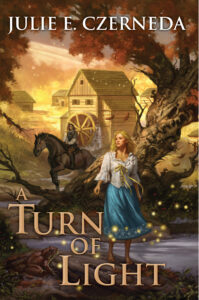
Now it’s your “turn,” fine folks. The science fiction writerly-me and the fantasy writerly-me, apparently the same person after all, are here and happy to answer your questions.
Giveaway: Post a comment or question today for Julie on the blog to win a copy of A Turn of Light.
Thank you, Julie, for being our guest today. Julie will be checking in throughout the day, so please feel free to post a comment or question for her. Thank you!

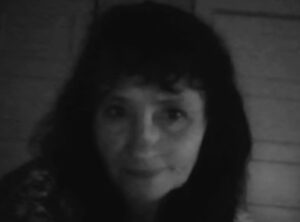
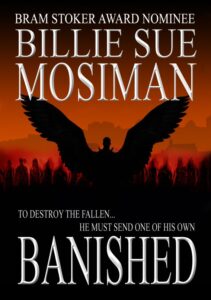


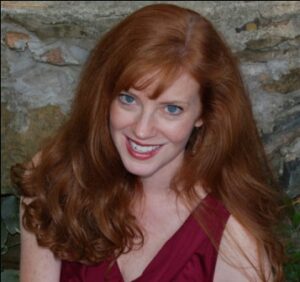



![image[1]](https://writtendreams.com/wp-content/uploads/2013/03/image1-300x118.png)
